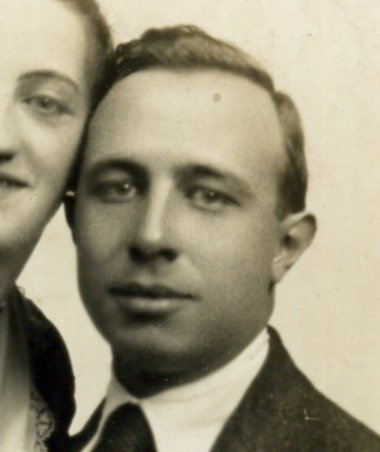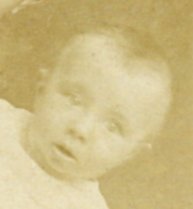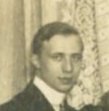Louis Lyle Knittel
Also known as
Lyle Knittel
Born
September 13, 1893
Manhattan, New York, New York
Died
September 19, 1976
Bronx, New York
Parents
Alexander M. J. Knittel
Sarah Josephine Irene "Dollie" Boyle
Siblings
Grace Anna Knittel
Ruth Frances Knittel
Spouse
Florence Fitzsimmons
June 6, 1923 in Bronx, New York
Children
Donald Alexander Knittel

Life Story
Lyle Knittel was born on September
13, 1893 in Manhattan to Alexander and Dollie Knittel. He essentially
grew up as an only child: a sister, Grace Anna, was born when he was five
but only lived for nine months; twelve years later when he was 18, he
became an older brother when his sister, Ruth was born.
Lyle left school after 8th grade and started to work at age 14 in the
brass industry where his Uncle Louis worked. In 1915 he was working in
"real estate" and living with his family, his Aunt Lillie and
Uncle Louis (Stolzenberg), his cousins Louis and Lillie and their grandmother
Sarah Boyle. At age 23, his career took an undesired turn to the army
when he was called to service. His WWI draft registration, which lists
him as 5'8", blue eyes, brown hair and balding, also referenced trouble
with his feet (falling arches) and claims that his parents and sister
were his dependents. His niece Dorothy Chace Bouley validated his feet
problems and noted that he always wore high ankle laced up shoes with
arches that were custom made in Manhattan until the day he died.
Despite his best efforts, his claims of falling arches and dependents
were not enough to keep him from being drafted, and he was sent to Camp
Upton on Long Island in October of 1917 where he held a clerical job for
the army. Letters that Lyle wrote home during his time with the army chronicle
his work, life in the army and his efforts to be released. After a month
he and 600 other men were sent by train to Camp Gordon in Atlanta. He
was the only one assigned to the military police unit. As early as December
1917, Lyle was hopeful he would be discharged within three weeks (based
on his problems with his feet) or at least sent back to New York to patrol
the harbors. Instead, he was drafted by the National Army at Camp Greenleaf
in Chickamuga Park, GA, a medical camp, where he was classified as C3
(unfit for overseas duty) but assigned to ordinance. By late September
1918 he was shipped to Camp Johnston in Jacksonville Florida, where his
company was quarantined because of a smallpox outbreak in another unit.
Lyle's letters also mention the outbreak of the flu epidemic and that
his replacement group had 400 cases with 40 to 50 deaths within the camp.
Letters written in November indicated his hope of being transferred home
by mid December but bureaucratic red tape and a self-serving, controlling
captain prevented the release of those who were not married or had no
dependents. Lyle writes that for seven weeks he had nothing to do except
to mark each box being loaded on a truck a few hours a day, "a job
that little Ruth could do." In late February he writes, "I still
hold the ever important position of standing with the marking pot and
brush." He feared that unless he gained his release soon, he would
be shipped off to Camp Bragg where there was a shortage of ordinance men.
By January many men had threatened to write their congressmen, and in
February one man in his unit had his father arrange for an ex-mayor to
write a letter with an affidavit claiming he was needed at home to support
his ailing father. Lyle followed this lead and enlisted his father's help
in getting Mayor La Guardia to write a letter directly to Washington.
Lyle was finally released with the assistance of New York Mayor La Guardia
and arrived home on St. Patrick's Day 1919.
In his letters to family, Lyle mentioned that when he returned home he
wanted to go to school to become an embalmer. Apparently he followed through
with this because by 1922 he and his father were listed in the New York
City directory as funeral directors. In the 1925 state census his occupation
was listed as undertaking.
Lyle's relationship with long-time girlfriend, Helen, whom he dated before
his service in the army and with whom he exchanged letters while in the
service, apparently ended after he returned. Lyle married Florence Fitzsimmons
on June 6, 1923. They had one son, Donald, born January 24, 1925 who died
at age 3 1/2 on September 16, 1928. He and his wife had no other children.
Lyle died on September 19, 1976 at the age of 83 and is buried in a family
plot in Mt. Hope Cemetery in Hastings-on-Hudson, NY. His wife, Flo, who
died in 1979, his father, his mother and his sister Ruth are also buried
in the family plot.
Seeking Information
Location of birth
Facts
| Occupation | New York City policeman | |
| Occupation | Undertaker |
Photo Gallery
See more photos here


1910-1911
Updated 11/20/14
